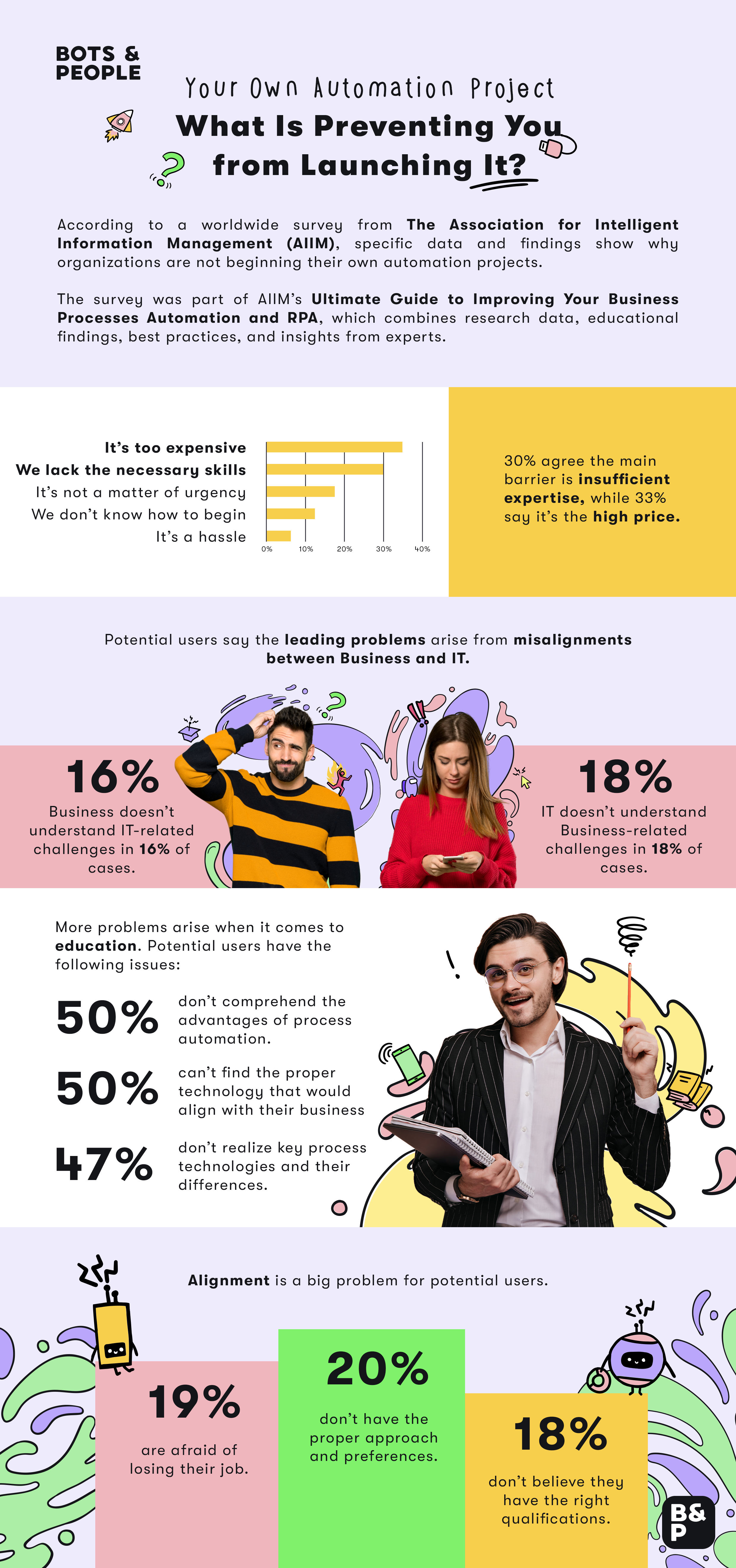The history of humankind has been filled with various inventions that made our work easier. Any innovation that did something instead of us — even the simplest tool — was a step towards automation.
As a civilization, we have finally reached the point where we can automate complex processes, so companies strive towards full automation. Even though we’re still not there, it seems that it could happen soon. According to McKinsey, after all, ⅓ of tasks in ⅔ could be automated.
Full automation benefits the company as much as it helps its employees, who will be able to concentrate on more meaningful work.
What Does a Fully-Automated Company Look Like?

A fully-automated organization automates every business process (or individual steps of those processes) whenever possible and makes sense. Such a company has a clear goal it wants to achieve with automation.
Here are the four main pillars of a fully-automated company:
- It assigns automateable robots to focus on the back-office tasks, helping everyone to focus on their primary job.
- Employees use bots as assistants that help them increase their overall productivity but also focus on more valuable work instead of losing time doing repetitive tasks.
- The development of new automation and apps becomes democratized, and power users can create them much more efficiently.
- The use of AI for every aspect of work means we could automate even more.
Automation in the Automotive Industry: A Great Example in History
The automotive industry has been one step ahead in terms of automation, as it has been using it for decades in one way or another. Perhaps one of the most exciting uses of automation is collaborative robots — also known as cobots.
Essentially, these are machines assisting operators on assembly lines. Robots took over the dangerous and repetitive jobs, but operators were taught to work with those robots and use them to speed up and improve their work.
One of the earliest use of robots was for welding bodies of cars and trucks. Instead of workers doing it and risking serious health problems, their job was to instruct the robots and watch them do their work. The welding process became more accessible and sophisticated as workers refined vehicle bodies to make them even better.
Nowadays, these collaborative robots are used all around car factories. The only issue that car manufacturers face is the lack of labor subsidized with the use of robots. In other words, many new job opportunities were created in the automotive industry by introducing automation. Workers got educated to use these aids and could do more with cobots than ever before.
From Big Factories to Every Office in the World
Automation isn’t only reserved for big factories and advanced industries, such as the automotive industry. Instead, we see instances of automation every day. For example, when we open an account on a site and receive a welcome email — that’s automation at work.
The point is, automation is nowadays available for medium and small businesses, and it can be used for all kinds of office tasks. Imagine a sales team that can entirely focus on their primary job — selling the product and service — while robots complete all administrative tasks and tedious paperwork with minimal human intervention.
Just like automotive workers managed to improve welding operations with cobots, office workers can enhance and facilitate their operations.
How Will Companies Benefit from Automation?
Companies already receive huge benefits by automating just some of their processes. These advantages will only improve in the future once they can fully automate all operations. Let's recall some of these benefits:
- Reduced costs – Companies spend a fortune on various processes that are inefficient and not optimized well. We can determine the best way to enhance the process by automating them, thus saving us a fortune.
- Reduced errors – It doesn't matter how capable the workers are: we all make mistakes. Instead of letting that happen, automation can smooth out the entire business process and lower the likelihood of errors.
- Increased productivity – Automation can handle many processes simultaneously so that companies can achieve more in less time.
- More efficient processes – We often aren't aware of the defects and inconsistencies in a process before we decide to automate it. Once we start breaking down the process step-by-step, we can see that there's always room for improvement. On top of that, automation can further enhance business processes by improving communication, visibility, and task management.
- Standardization – A business process could be messy when workers rely on their methods of work and habits. A properly designed and automated process will follow specific standards that all stakeholders will have to stick to, thus harmonizing how people work and interact with each other.
- Room for further improvement – Once a process is automated, it's easier to track everything. This makes it easier to audit the process and ultimately discover the possible ways to improve it further.
- Ensured compliance – Automation is much more than a set of rules to execute a specific task (or set of tasks). It also involves making the process secure and confidential and determining how personal data is retained. After all, your fully-automated company won't last long if it's not compliant.
- Better customer experience – Apart from making it easier for the company and its workers, automation aims to make your product and service better for your clients as well. By automating customer-facing processes, you can provide faster and more accurate service, as well as better assistance and support.
- Better scalability – As the scope of work increases for your company, you'll need to scale accordingly. If you could onboard five clients without automation, suddenly jumping to 100 clients a day won't be possible. In contrast, this won't be an issue if the onboarding process is fully automated.
How Will Employees Benefit from Automation?
Like any other tool, automation is there to aid humans. We already mentioned some of the significant ways workers could benefit from automation in a fully-automated company, and here’s a quick recap.
- Increased individual productivity – Individual employees will be able to do more in less time once the processes they’re included in are enhanced with automation.
- Better consistency – Some employees have less consistent results than others, and that’s okay. We all have days when we don’t do well, no matter how hard we try. Automation can help us improve consistency so that we don’t make huge mistakes on our bad days.
- Better morale – Employees lose enthusiasm, especially if they’re part of a poorly-optimized process and cannot see the results of their effort. Once the process is optimized and automated, employees will see a sudden increase in output, improving their confidence and lifting their spirits.
- Less monotony – Employees tend to underperform because they feel their work is monotonous and boring. Repetitive tasks become robots’ problems once automation is introduced, meaning employees completely focus on the more interesting and more challenging part of their job.
- Increased safety – While this may not necessarily be the case in an office setting, automation can greatly enhance worker safety in situations where robots assist with challenging tasks (such as welding vehicle bodies).
- Opportunity to grow – Workers have a chance to learn more about automation and understand how they can use it to improve their work. Moreover, they can continue to grow in their field of expertise as they’ll have more time to focus on learning instead of spending that time on doing repetitive tasks.

How Companies Can Achieve Full Automation
It’s not possible to fully automate a company at once. It’s a step-by-step process that may take some time, but it will be worthwhile, as both the company and its employees will benefit from it, as described above.
Automation Academy
The first step to implementing automation completely is making sure everyone understands what it is and how to use it. Educating all workers is beneficial for making automation work in your favor, as everyone will know what they should do once you start automating processes. The more people understand automation, the faster you’ll fully be able to automate your company.
Bots & People offers a knowledge hub, as well as engaging courses on everything related to automation, including automation strategy, process mining, RPA, AI, IPaaS, and more.
Automation as a Service
Automation as a Service (AaaS) assist companies with shifting from slow and manual to optimized and automated business processes. Such services are with the company on its every step towards automation, including research, education, consulting, and, ultimately, execution.
Internal Center of Excellence
Centers of Excellence have existed for decades and are used for all kinds of purposes. Their goal was to share and implement the cumulative knowledge across sectors in a company and, ultimately, assess and improve business tasks. In the business process optimization and automation era, having an internal CoE could prove essential to achieving complete automation.
Consultancy
With the rise of automation, new job opportunities opened up, with many professionals focusing on helping companies implement automation in their processes successfully. They are often referred to as Automation Consultants, and they are often a small but powerful cog in your automation strategy that will set the entire clockwork into motion.
Final Thoughts: A Fully-Automated Company Empowers Humans
Some companies are one step away from full-automation, which could give them a significant advantage over the non-automated competition.
Automation doesn’t only improve the state of the company as a whole. It benefits individual employees as much since it helps them with everyday tasks, boosts their morale, and ultimately allows them to do more meaningful work.
All in all, automation is there to assist humans and not the other way around. Hence, a fully-automated company values its employees and gives them a chance to prosper by empowering them with automation and educating them about its benefits.









